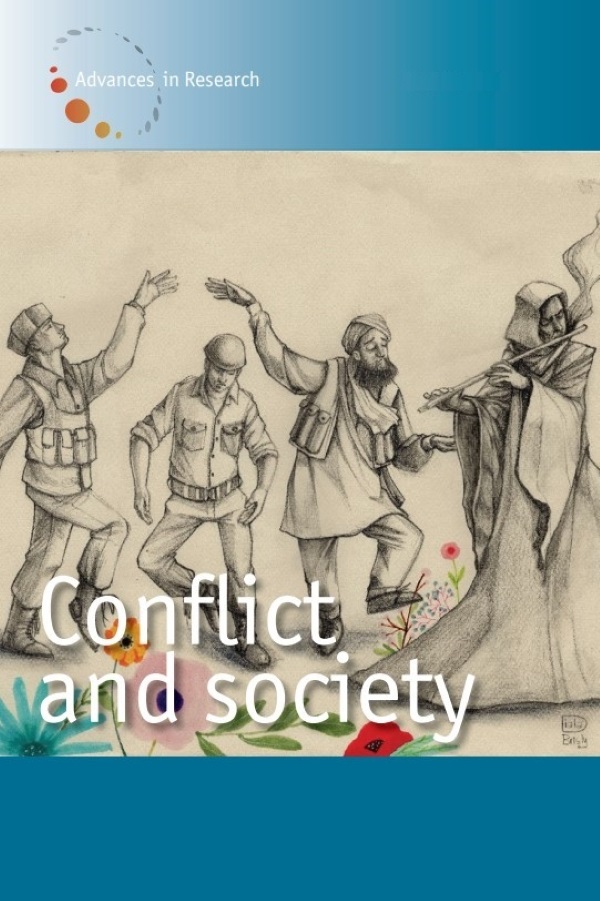Our growing collection of Open Access content is available to meet your remote learning and online teaching needs during these trying times. Berghahn Journals invites you to share this list with your students and colleagues.
Continue reading “Berghahn Journals Open Access”Tag: conflict and society
Berghahn Journals: New Issues Published in October
Celebrate EASA 2018 with Berghahn Journals!
Berghahn Journals will be present at European Association of Social Anthropologists (EASA) 2018: Staying, Moving, Settling! To celebrate, we are delighted to offer EASA conference attendees free access to our complete Anthropology collection for the month of August! To access all the journals in the collection, login to our website and use the code EASA2018 (valid through August 31, 2018). View redemption instructions.
For a full list of anthropology journals, view our collections page.
View a list of Berghahn Editors and Editorial Board Members and their EASA panels below:
Continue reading “Celebrate EASA 2018 with Berghahn Journals!”
Berghahn Journals: New Issues Published in September
Berghahn Journals: New Issues Published in August
New and Notable Titles from Berghahn Books & Journals
NEW & NOTABLE BOOKS
Continue reading “New and Notable Titles from Berghahn Books & Journals”
Association for the Study of Nationalities Conference
 We are delighted to inform you that we will be attending the 20th Annual Association for the Study of Nationalities World Convention (23-25 April 2015) at Columbia University in New York City. Berghahn will be exhibiting for one day only! Please stop by our stand on Friday April 24th, and don’t miss your chance to browse our selection of books and pick up FREE journal samples!
We are delighted to inform you that we will be attending the 20th Annual Association for the Study of Nationalities World Convention (23-25 April 2015) at Columbia University in New York City. Berghahn will be exhibiting for one day only! Please stop by our stand on Friday April 24th, and don’t miss your chance to browse our selection of books and pick up FREE journal samples!
For more info about the Association for the Study of Nationalities, click here.
If you are unable to attend, we would like to provide you with a special discount offer. For the next 30 days, receive a 25% discount on any of the titles listed below. Simply enter the code ASN15 at checkout. Visit our website for a complete listing of all published and forthcoming titles.
Continue reading “Association for the Study of Nationalities Conference”
Announcing 3 New Journals!
 Berghahn Journals is delighted to announce that we will begin publishing three new journals in 2015!
Berghahn Journals is delighted to announce that we will begin publishing three new journals in 2015!
These new publications will cover a range of topics across disciplines and promote academic discussion through articles, reviews, interviews, special sections, and more. For more information, please see below or click through to access the journals’ respective websites.
Boyhood Studies – An Interdisciplinary Journal
Boyhood Studies: An Interdisciplinary Journal is a peer-reviewed journal providing a forum for the discussion of boyhood, young masculinities, and boys’ lives by exploring the full scale of intricacies, challenges, and legacies that inform male and masculine developments. Boyhood Studies is committed to a critical and international scope and solicits both articles and special issue proposals from a variety of research fields including, but not limited to, the social and psychological sciences, historical and cultural studies, philosophy, and social, legal, and health studies.
One of the core missions of the journal is to initiate conversation among disciplines, research angles, and intellectual viewpoints. Both theoretical and empirical contributions fit the journal’s scope with critical literature reviews and review essays also welcomed. Possible topics include boyish and tomboyish genders; boys and schooling; boys and (post)feminisms; the folklore, mythology, and poetics of “male development”; son-parent and male student-teacher relations; young masculinities in the digital and postdigital ages; young sexualities; as well as representations of boyhoods across temporalities, geographies, and cultures.
Conflict and Society – Advances in Research
Organized violence — war, armed revolt, genocide, lynching, targeted killings, torture, routine discrimination, terrorism, trauma and suffering — is a daily reality for some while for others it is a sound bite or news clip seen in passing and easily forgotten. Rigorous scholarly research of the social and cultural conditions of organized violence, its genesis, dynamic, and impact, is fundamental to addressing questions of local and global conflict and its impact on the human condition.
Publishing peer-reviewed articles by international scholars, Conflict and Society expands the field of conflict studies by using ethnographic inquiry to establish new fields of research and interdisciplinary collaboration. An opening special section presents general articles devoted to a topic or region followed by a section featuring conceptual debates on key problems in the study of organized violence. Review articles and topical overviews offer navigational assistance across the vast and varied terrain of conflict research and comprehensive reviews of new books round out each volume. With special attention paid to ongoing debates on the politics and ethics of conflict studies research, including military-academic cooperation, Conflict and Society will be an essential forum for scholars, researchers, and policy makers in the fields of anthropology, sociology, political science, and development studies.
Screen Bodies is a peer-reviewed journal focusing on the intersection of Screen Studies and Body Studies across disciplines, institutions, and media. It is a forum promoting the discussion of research and practices through articles, reviews, and interviews that investigate various aspects of embodiment on and in front of screens. The journal considers moving and still images, whether as entertainment or for information through cinema, television, and the Internet; through the private experiences of portable and personal devices; or in institutional settings such as medical and surveillance imaging. Screen Bodies considers the portrayal, function, and reception of the body presented and conceptualized through the lenses of gender and sexuality, feminism and masculinity, trans* studies, queer theory, critical race theory, cyborg studies, and dis/ability studies.
















